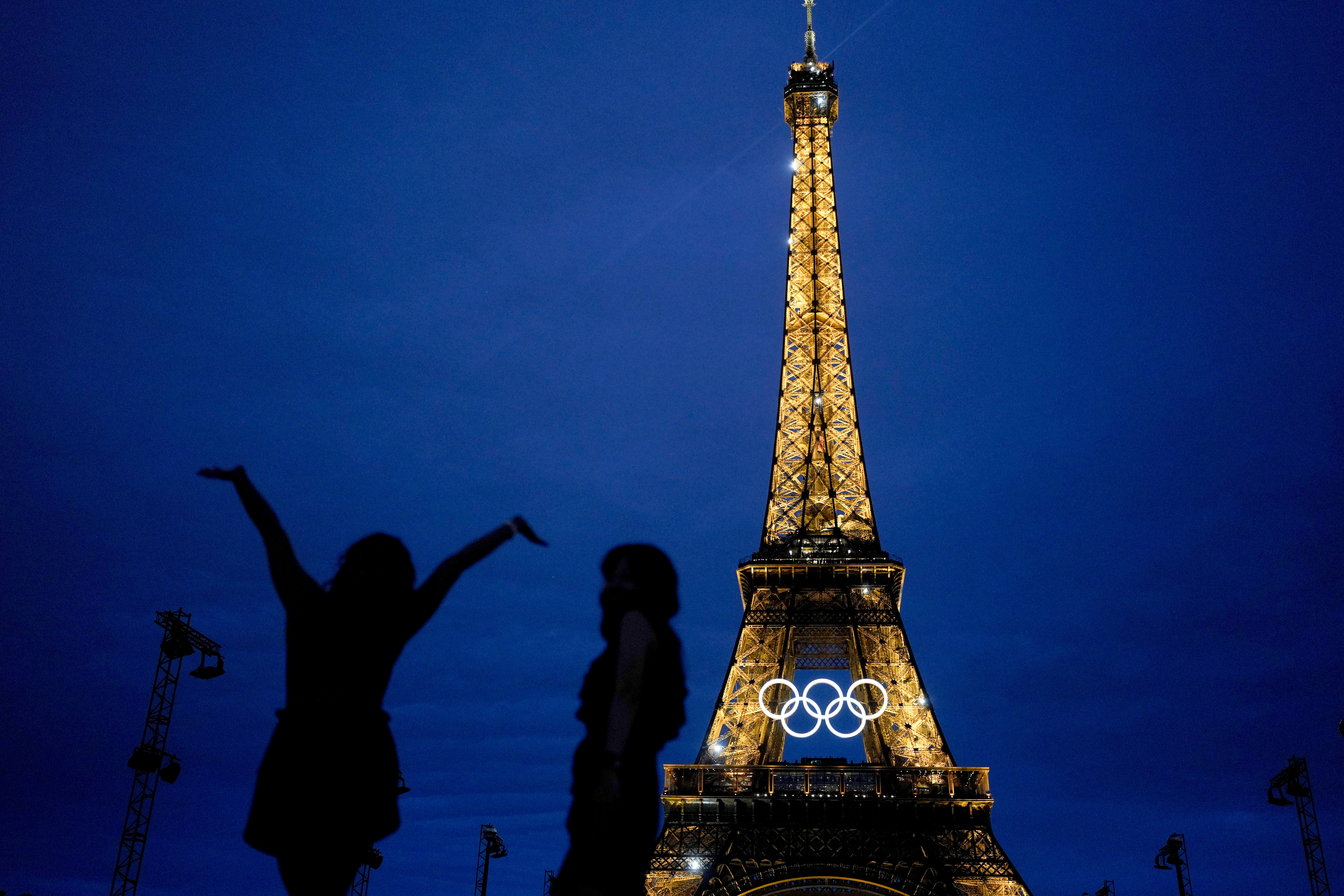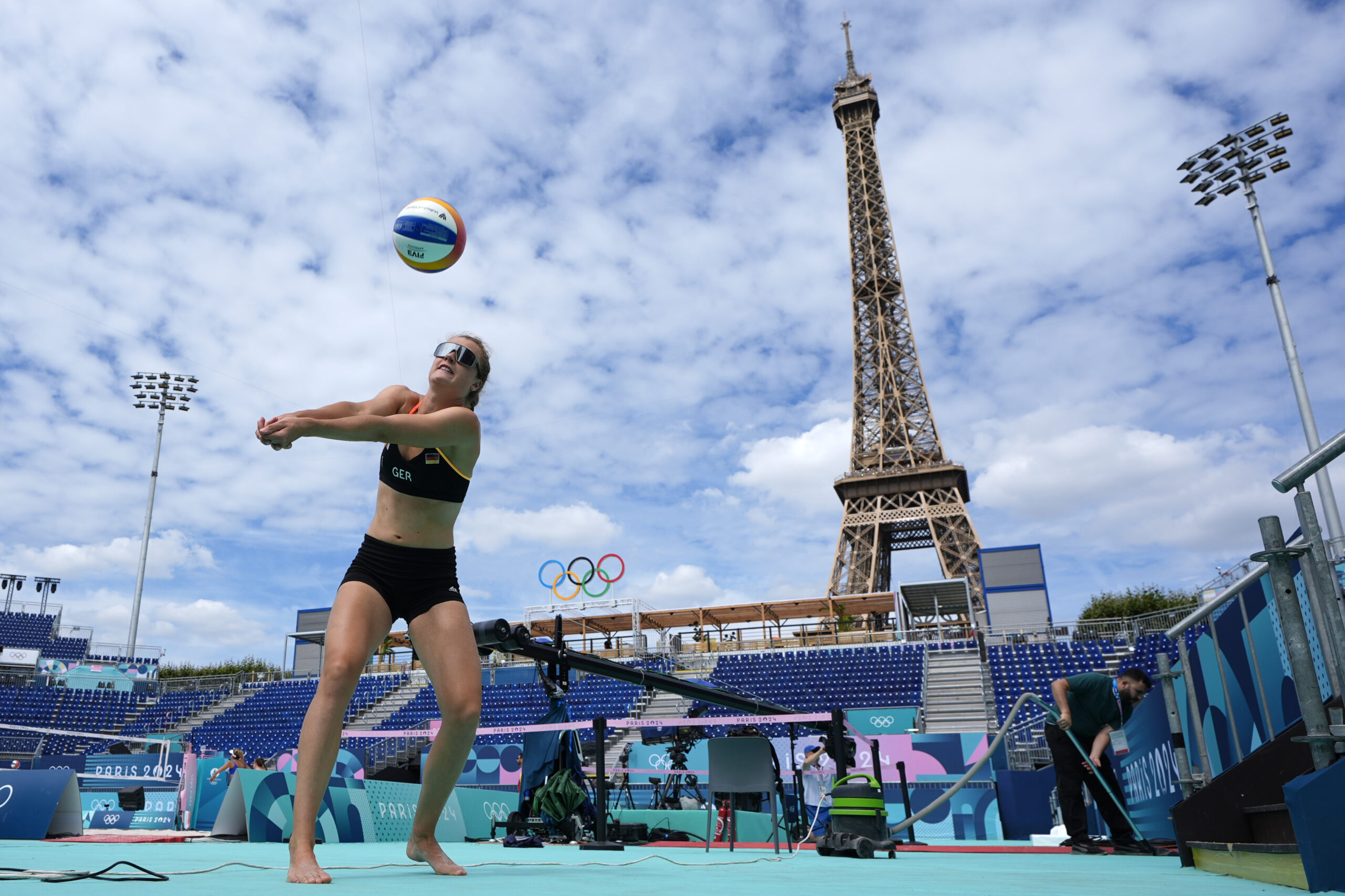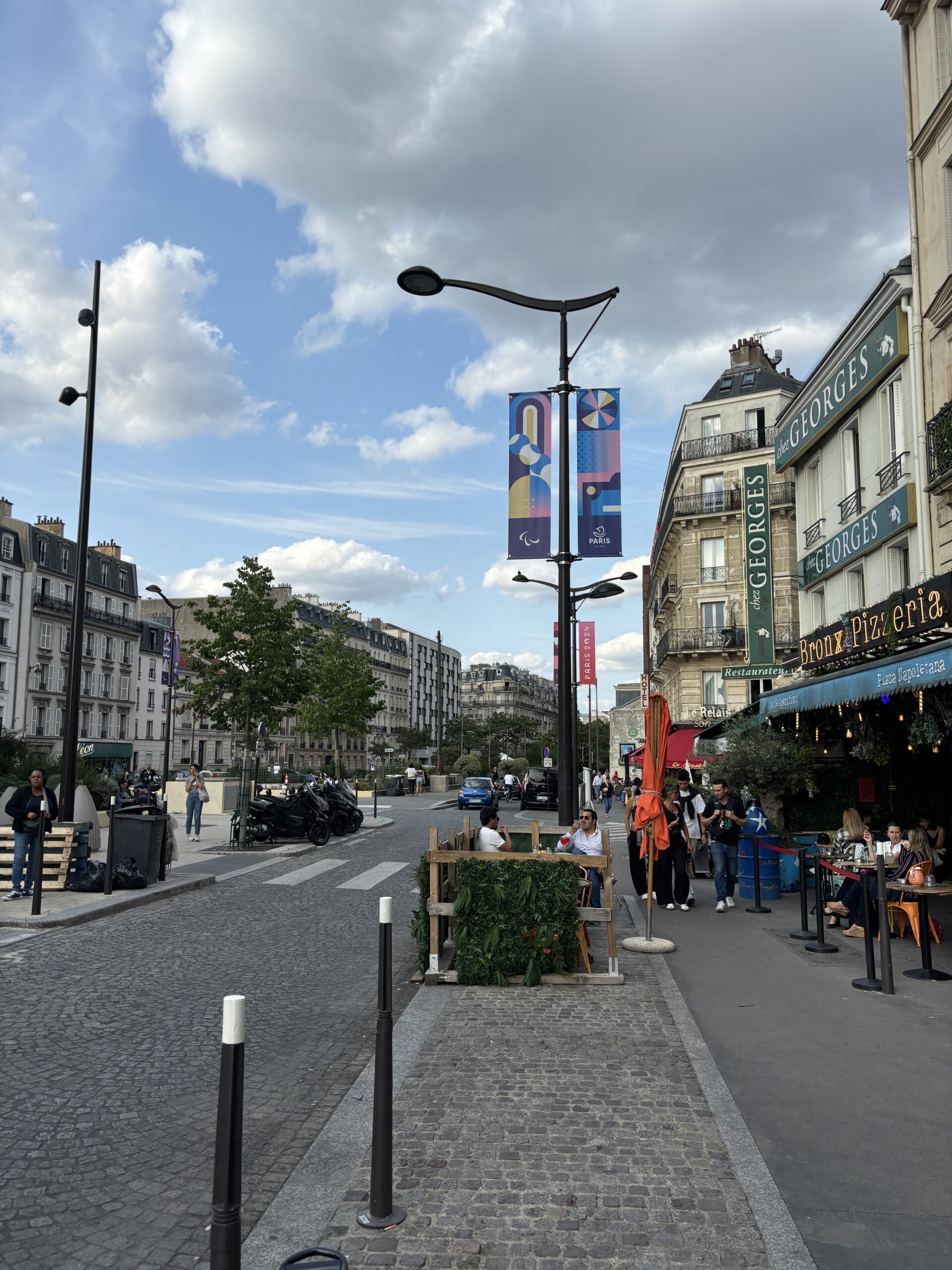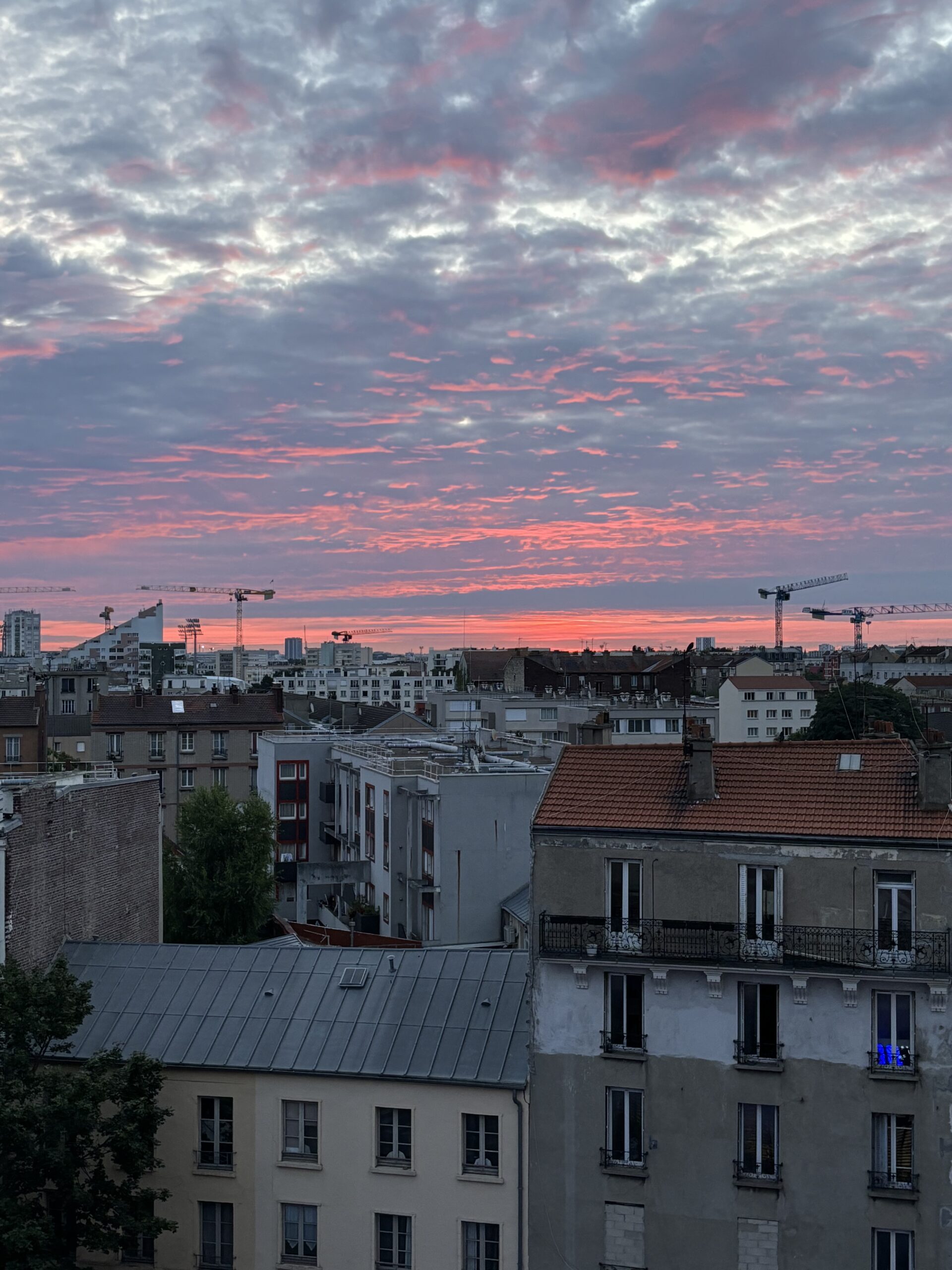
PARIS — From the first steps upon landing, you see the logo. Whether black and white or in shades of pastels, from the airport to the train station, in shops and banners lining the streets with classic French architecture, signs of the Olympic Summer Games are unmistakable.
Seldom at a store, boulangerie, bar or even a McDonald’s do you not see a volunteer in a Paris 2024 shirt, either heading off to their next duty or taking a quick break. But there is not a rush around the city; this is France, after all, where everything from sidewalk strolls to meals are an experience to savor.
Savor? That is the emotion the International Olympic Committee hopes will reside with those who compete and attend the 2024 Olympic Summer Games. When the flame is lit at the end of what is an Opening Ceremony even French President Emmanuel Macron says initially felt like “a crazy and not very serious idea,” the Games will be able to celebrate in a way it has not in nearly a decade.
Sponsored Content
The IOC, along with Parisians, hope these Games are a party. A chance for the Olympic Movement to relaunch itself after eight years in pandemic-related protocols, a chance to showcase an ambitious move to what the IOC hopes is a new way to experience the Olympics, a chance for Paris to show itself off in a way that even it has never been able to do before, a chance for the U.S. Olympic movement to make fans love the Games again.
Follow 2024 Olympic Summer Games Coverage Here
The most sprawling and elaborate Olympics perhaps ever features 16 days of competition with scenes that organizers hope awe those in attendance and those watching on television. The next few weeks will be an exercise in French audacity, encouraged and promoted by the IOC while knowing the movement itself needs a successful Games like perhaps never before.
Paris Transforms For The Games
Paris, at the heart of it, is one of the most breathtakingly gorgeous cities in the world. At its centerpiece is one of the world’s most famous landmarks, the Eiffel Tower — which, for weeks now, has had the Olympic rings hanging between its first and second floors, glowing at night and becoming perhaps even more of a tourist draw.
The Olympic Summer Games, as only it can, has transformed some of the capital’s tourist icons. Place de la Concorde has been transformed into a spectacular temporary stadium that will host 3×3 basketball, skateboarding and breaking. Versailles will host equestrian and modern pentathlon; fencing and taekwondo will be at Grand Palais while beach volleyball will be at Champ de Mars park at the foot of the Eiffel.

“Paris is a global city very well equipped when it comes to sports,” said Cédric Vanden Bogaerde, the chief executive officer at the International Academy of Sport Science and Technology and someone who worked for 11 years at the IOC. “When you’re in such an environment, there’s no reason not to exploit the resources available.”
For all of its landmarks being paired with sports, there is one event, in one location, that signifies Paris’ willingness to think differently than any other Olympic host: The Opening Ceremony on the River Siene, finishing at sunset in the shadows of the Eiffel Tower.
The Seine, famously polluted for decades, has been beautified at a cost of about $1.5 billion. Up to 320,000 paying and invited ticketholders are expected to line the Seine’s banks as athletes are paraded along the river on boats. The Opening Ceremony, in perhaps some deeper meaning, is Paris and France making a broader statement about its courage to have, as they put it, ‘Games Wide Open’ in a city plunged into mourning by extremist attacks in 2015 that killed 130 people.
“The challenge that you try and push each host country is what can you bring new to the Olympic brand?” said Michael Payne, head of the marketing division of the IOC from 1989 through 2004. “How can you add a little bit of your thinking and magic? The French, they like big ideas and it probably doesn’t get any bigger than doing an Opening Ceremony down the Seine. It’s bonkers — and you would only ever try and do something as crazy as that for an Olympic Games.”
Paris has unabashedly used the Games to promote sustainability, being the home to where in 2015 leaders around the world signed commitments to prevent global warming. One of the very few new venues built specifically for the Games is the aquatics center, which has seats made from “recycled local plastic waste” with wood used throughout construction.
The beds in the athletes’ village were constructed using recycled cardboard and areas in the village will feature “coffee tables made from recycled shuttlecocks, poufs from parachute canvas and chairs from recycled bottle tops,” organizers told the BBC. The village also has no internal air conditioning units, although some delegations (including the United States) brought temporary AC units for their athletes.
As with every Olympic Games, there is debate whether hosting the event really does spur development within a city. Paris’ plans will put that debate to a long-term test; the village and aquatics center are in the Seine-Saint-Denis region, one of the poorer and dangerous areas in the city. The village will later become a housing and business development area; the aquatics center is expected to help teach more children to swim, one of the ways Paris is leveraging the Games.
“The Olympic brand doesn’t necessarily need Paris to be an iconic brand,” said Vanden Bogaerde. “Paris doesn’t necessarily need the IOC and Olympics to be an iconic city. But when you bring the two together, you create something unique and even stronger.”

The IOC’s Parisian Agenda
The IOC’s hope, surely, is that it will end up in a stronger position after the Paris Games.
“There’s no question everybody close to the Olympic movement think and say this is very important,” said BCW Sports Managing Director Lars Haue-Pedersen. “And that just puts a lot of expectations on Paris.”
The Olympic Movement is, in some ways, at a fork in the road. The past two editions of the Games, Summer and Winter, were held under COVID-related restrictions. The PyeongChang Winter Games of 2018, while successful operationally, were not great by TV measures.
The Rio Summer Games of 2016 were an operational mess; “it was a miracle those Games took place because the organization behind the scenes was, to put it diplomatically, seriously dysfunctional,” Payne said. “The IOC leadership, they went to bed each night not knowing if the Games would take place the next day. It was that bad.”
“There’s no question everybody close to the Olympic movement think and say this is very important. And that just puts a lot of expectations on Paris.”
BCW Sports Managing Director Lars Haue-Pedersen
Then there’s the 2014 Winter Games in Sochi, Russia, of which the IOC at the moment would rather not talk about for a variety of reasons. So, you really have to go back to the 2012 Summer Games in London to find the last Games that would be considered an unqualified success.
With estimated overall costs of around $9.7 billion, Paris’ expenses could end up less than for Tokyo, Rio and London. Between a budget that is “economic” by Games standards and Paris’ willingness to merge iconic landmarks and sports — 90 percent of the venues are temporary or already existed — Paris could be a before-and-after Olympic watershed for the IOC’s Agenda 2020 +5, which was developed in an attempt to avoid some of the exploding budgets that hosting the Games would bring to cities.
A strong Games will also help the IOC’s marketing division. “The Olympic Partner” program, known as TOP, has 15 sponsors currently with several having deals close to expiration.
“I fully expect this to be a transformative Games there,” said 3 Emerald Marketing’s Michael Lynch, a veteran of the Olympic landscape. “There is a transition that’s going on here with the economics and the whole business model I hope the IOC will embrace. … I like the IOC’s chances here with Paris a lot, but it’s a business and there’s a lot of transition with some of the changing of the guard and the TOP family and the like.”
A key part of Olympic sponsorship is, given the amounts of money a package costs, having exclusive experiences for those sponsors — the exact type of experiences the IOC have not been able to provide since 2018.
“Olympic sponsors care about two things,” Haue-Pedersen said. “They can use the affiliation with the Olympic brand and rings in their commercials. And they do wonderful stuff so boring companies suddenly come really to life. … Many of the top sponsors, they play an active role in the delivery of the Games. And it’s a perfect way to showcase your abilities as a brand.
“I’m not in the camp of saying that IOC sponsorship is in trouble,” Haue-Pedersen said. “I don’t think so. They have proven those people wrong for the last 24 years.”
Staying Safe from Hackers
The anticipated images from the Opening Ceremony are of celebration, or color and pageantry. The integration of sport within Paris should set social media ablaze.
There is also unmistakable risk.
Having an open-air Opening Ceremony plus sports in so many temporary arenas in the heart of Paris have made safeguarding the Games a complex operation. Paris will deploy 35,000 police officers each day for the Olympics, with a peak of 45,000 for the Opening Ceremony. A 10,000-strong military force is patrolling streets and carrying out other security missions. France also is getting help from more than 40 countries that together have sent at least 1,900 police reinforcements.
The risks involved were reinforced — as if they needed to be — in the early hours of Friday morning when service on three high-speed train lines was disrupted because of arson, the national railway company said.
“Security is always the number one headache and when you’re staging the Games in central Europe, in a nation that does have a history of internal security challenges, with Russia being very upset that they are not invited …” Payne said, leaving the rest unsaid.
Another person said quietly: “I’m worried about (Russia President Vladimir) Putin.”
There is good reason to be. It was Russia that attempted to hack the Opening Ceremony of the 2018 Winter Games in PyeongChang in response to international condemnation of its state-orchestrated doping program that put it and the IOC in contretemps even before it invaded Ukraine. Paris Games organizers have been facing major cyberattack concerns mostly born from Russia.
And Paris prosecutors said they arrested a 40-year-old Russian-born man Tuesday and charged him with “conducting intelligence work on behest of a foreign power”; during a search of the suspect’s home, police agents found items that “raised fears of his intention to organize events likely to lead to destabilization of the Olympic Games,” prosecutors said.
The IOC’s long dance of whether to allow “neutral” athletes from the moment Russia’s invasion of Ukraine began has led to the smallest team of Russian athletes since 1908. Three years ago in Tokyo, Russia had 334 athletes. In Paris, there will be 16 “neutral athletes” from Russia to go with 16 from Belarus.
“Perhaps at the beginning, they were not tough enough after Sochi and the doping perspective,” Payne said. “But I don’t think anybody today can now say the IOC hasn’t been very hard and tough on Russia. I think if the IOC had that time again, they might rephrase some of the language. But then tell me a politician or a political organization that hasn’t had to move with the times and who necessarily expected this particular situation to drag on as long as it has, or that particular situation to take a sudden turn. It isn’t straightforward.”
Revitalizing U.S. Excitement
One thing that is straightforward is that the U.S. Olympic movement, with the 2028 Games in Los Angeles, is counting on the next few weeks to re-light the flame within fans who have, over the past decade, stopped following the Games as much as previous generations.
“Nothing quite compares to the spotlight that we’ll have around these Games in Paris,” said USOPC Chief Executive Officer Sarah Hirshland in mid-April. “We need these to be big, no doubt about it. We need Paris to go well and we need it to be great.”
With the roster of athletes it has in nearly every sport, there’s almost no question the United States will win the medals table. What is a question will be the promotion of the Olympics via viewership on NBC channels.
The U.S. television contract is one of the IOC’s biggest sources of revenue and as the NBC deal winds down (currently set to expire after the 2032 Games), Olympic viewership has tumbled in the U.S. since Rio de Janeiro in 2016. Those Games averaged 22.7 million viewers in prime time; the Tokyo Games in 2021 averaged 15.6 million viewers per night before the 2022 Beijing Winter Olympics averaged 11.4 million, the least-watched Olympics in the modern era.
“Paris lends itself a lot better from a time zone standpoint … (NBC is) going to win every single night of prime time, no question about it,” Lynch said. “But they’re going to be fractured in that there’s so many different platforms now that we can enjoy it. The smart thing about NBC is that they’ve embraced a lot of the social platforms rather than compete with them.”
NBC’s biggest social platform will be Peacock, which will stream 5,000 hours of coverage. NBC’s overall Olympic content will exceed 7,000 hours; Payne points out the last time the U.S. hosted a Summer Games, 1996 in Atlanta, there were 171 hours of coverage.
“There’s not enough informed analysis going on because everybody focuses on the prime-time ratings,” Payne added. “Prime time is not the only way people are now consuming the Olympics. Everybody runs to the Nielsen audience and compares that to the previous one. But nobody’s counting how much you’re watching on the phone or how much you’re talking on social.
“Now, that’s not to say that the IOC, the USOPC and LA28, they can’t just sit on their backsides and expect everybody to automatically tune in. You have to be far more proactive and engaging and developing in exactly the same way as each of the American sports leagues are, because it’s getting more complicated. But once you curate it and put it together in the right package, you’ve still got something that people really care about.”

There’s Always Paris
There is near-unanimous belief that people will care about these Games. And Paris is always a good idea, as the saying goes. So, will these Games end up being a good idea?
“Tokyo was the light at the end of the tunnel,” said Vanden Bogaerde. “Paris is the end of the tunnel and the start of normal Games again. I have no doubt these will be great Games. I can’t wait to see the images.”
Walking out of the Main Press Center in the middle of Paris one evening, as the light started ever so slightly to wane and people gathered outside of restaurants to sip on drinks, there were no outward signs of nerves within Paris. More than any day before the official kickoff to any Games in eight years, it felt normal.
“This Games is the reunion Games,” Lynch said. “What I look most forward to is bringing the Olympic community back together again showcasing these amazing human talents.
“The Yankees and the Red Sox don’t particularly get along. But guess what? They’re on the same side as it relates to the Olympics rooting for Team USA. That’s the beauty of the Games. It not only brings a nation together when we’re as divided as they come, but it’s going to hopefully bring the world together. And that’s really the power of sport.”












 Copyright © 2025 by Northstar Travel Media LLC. All Rights Reserved. 301 Route 17 N, Suite 1150, Rutherford, NJ 07070 USA | Telephone: (201) 902-2000
Copyright © 2025 by Northstar Travel Media LLC. All Rights Reserved. 301 Route 17 N, Suite 1150, Rutherford, NJ 07070 USA | Telephone: (201) 902-2000